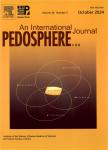Disposal and Use of Sewage on Agricultural Lands in Pakistan: A Review
Disposal and Use of Sewage on Agricultural Lands in Pakistan: A Review作者机构:Institute of Soil and Environmental Sciences University of AgricultureFaisalabad-38040 (Pakistan) Centre for Environmental Risk Assessment and Remediation University of South Australia International Centre for Agricultural Research in the Dry Areas (ICARDA) International Water Management Institute (IWMI) Technical Services Department Fauji Fertilizer Company Ltd.
出 版 物:《Pedosphere》 (土壤圈(英文版))
年 卷 期:2010年第20卷第1期
页 面:23-34页
核心收录:
学科分类:083002[工学-环境工程] 0830[工学-环境科学与工程(可授工学、理学、农学学位)] 08[工学]
主 题:contamination heavy metals irrigation soil quality vegetables
摘 要:Raw sewage is widely used on agricultural soils in urban areas of developing countries to meet water shortages. Although it is a good source of plant nutrients, such sewage also increases the heavy metal load to soils, which may impact the food chain. Management options for sewage contaminated soils includes addition of nontoxic compounds such as lime, calcium sulfate and organic matter, which form insoluble metal complexes, thus reducing metal phytoavailability to plants. In this paper we review the variation in irrigation quality of sewage at different sites and its impact on the quality of soils and vegetables. Although quality of sewage was highly variable at source, yet the effluent from food industries was relatively safe for irrigation. In comparison effluent samples collected from textile, dyeing, calendaring, steel industry, hospitals and clinical laboratories, foundries and tanneries were hazardous with respect to soluble salts, sodium adsorption ratio and heavy metals like zinc, copper, iron, manganese, nickel, cobalt and cadmium. The sewage quality in main drains was better than that at the industry outlet, but was still not safe for irrigation. In general, higher accumulation of metals in fruits and vegetable roots was recorded compared to that in plant leaves, Edible parts of vegetables (fruits and/or leaves) accumulated metals more than the permissible limits despite the soils contained ammonium bicarbonate diethylenetriaminepentaacetie acid extractable metals within a safe range. In either case further scientific investigations are needed to ensure safe management strategies. Cadmium appeared to be the most threatening metal especially in leafy vegetables. It is advisable to avoid leafy vegetables cultivation in sewage irrigated areas everywhere to restrict its entry into food chain.



